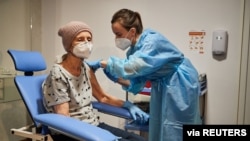The World Health Organization on Monday said two new studies illustrate how it makes economic sense to provide equal access to COVID-19 vaccines.
At the agency’s COVID-19 briefing in Geneva, WHO Director-General Tedros Adhanom Ghebreyesus referenced the studies, saying they show that not delivering equitable access to vaccines would not only be “a catastrophic moral failure” but an economic failure, as well.
He said a new study from the International Labor Organization (ILO) analyzing the impact of the COVID-19 pandemic on the global labor market shows that last year, the pandemic cost the world economy 8.8% of total possible working hours — the equivalent of losing 255 million full-time jobs.
The report projects that most countries will recover in the second half of 2021, depending on the vaccination rollout. ILO President Guy Rider is calling for, among other recommendations, international support for low- and middle-income countries, which have fewer financial resources to roll out vaccines and promote economic and employment recovery.
In a second study, Tedros noted the International Chamber of Commerce Research Foundation makes a strong economic case for vaccine equity. The study shows that if the world’s wealthiest nations are fully vaccinated, while the poor nations are half vaccinated, it could drag down the global economy by about $9.2 trillion. Almost half of that — $ 4.5 trillion — would be incurred in the wealthiest economies.
Tedros noted the WHO-managed Access to COVID019 Tools (ACT) accelerator program, designed to get vaccines to the poorest nations, currently has a funding gap of $26 billion, a small sum compared with the losses that would be incurred by not ensuring every country has access to vaccines.
“If fully funded, the ACT Accelerator would return up to $166 for every dollar invested,” Tedros said.
Quoting the Chamber of Commerce study, Tedros said, "This is not charity. It’s economic common sense.”









